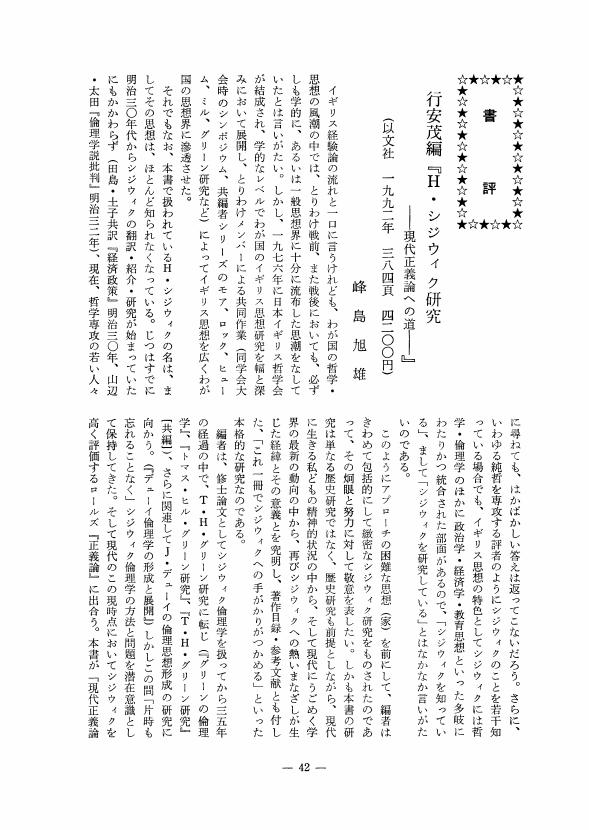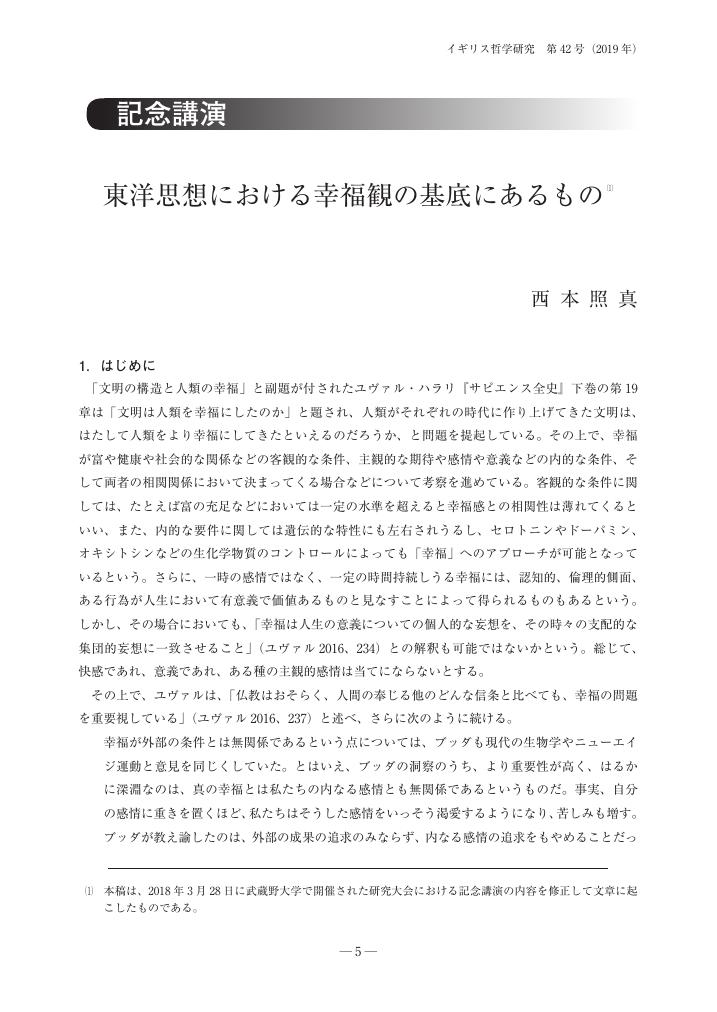1 0 0 0 OA 書評
1 0 0 0 OA 書評
1 0 0 0 OA 書評
1 0 0 0 OA 書評
1 0 0 0 OA 書評
- 著者
- 柏崎 正憲
- 出版者
- 日本イギリス哲学会
- 雑誌
- イギリス哲学研究 (ISSN:03877450)
- 巻号頁・発行日
- vol.43, pp.59-76, 2020
<p>It is only recently that Locke scholars have begun to pay attention to his translation of Jansenist Pierre Nicoleʼs <i>Essais de morale</i> in relation to Locke's application of hedonism and other related topics. This paper attempts to elucidate Nicole's influence on Locke's moral thoughts, and Locke's innovative adaptation of Nicole's arguments about what human weakness means in moral life that inspired a comparatively more forgiving evaluation of human reason, self-love, and moral virtue in his later years. His interpretation and adaptation of Nicole's moral thoughts allowed him to reconcile human nature with a prospect for human perfection through the improvement of hedonically motivated action and the contractual nature of society itself. One can trace the development of Locke's moral thought process during his translation of Nicole's work, and witness the taking shape of some of the most important insights and arguments that would become fully developed in his major works, <i>An Essay Concerning Human Understanding</i> and <i>Two Treatises of Government</i> in the later years.</p>
1 0 0 0 ロールズとシジウィック:―反照的均衡概念をめぐって―
- 著者
- 池田 誠
- 出版者
- 日本イギリス哲学会
- 雑誌
- イギリス哲学研究 (ISSN:03877450)
- 巻号頁・発行日
- vol.37, pp.31-44, 2014
<p>John Rawls is famous for his Kantian conception of justice, and also well known for reviving the significance of Henry Sidgwick's ethical thought in contemporary ethics. Rawls praises Sidgwick partly because Sidgwick attempted to justify a Method of Ethics by appealing to its ʻreflective equilibriumʼ with our considered judgments. However, this interpretation of Sidgwick by Rawls has been criticized by some utilitarians such as Peter Singer. I argue that, against his wish, Singer rather supports Rawlsʼs interpretation of Sidgwick as a reflective-equilibrium-theorist. Furthermore, I defend Rawlsʼs reflective-equilibrium methodology by pointing out his conception of justification behind it and by showing Singerʼs inappropriate conception of objectivity in ethics.</p>
1 0 0 0 ジョージ・グロートのソクラテス論
- 著者
- 大久保 正健
- 出版者
- 日本イギリス哲学会
- 雑誌
- イギリス哲学研究 (ISSN:03877450)
- 巻号頁・発行日
- vol.20, pp.5-18, 1997
1 0 0 0 OA 東洋思想における幸福観の基底にあるもの
- 著者
- 西本 照真
- 出版者
- 日本イギリス哲学会
- 雑誌
- イギリス哲学研究 (ISSN:03877450)
- 巻号頁・発行日
- vol.42, pp.5-13, 2019-03-20 (Released:2020-04-28)
- 参考文献数
- 6
1 0 0 0 OA ホッブズの教会論と助言
- 著者
- 上田 悠久
- 出版者
- 日本イギリス哲学会
- 雑誌
- イギリス哲学研究 (ISSN:03877450)
- 巻号頁・発行日
- vol.42, pp.33-49, 2019-03-20 (Released:2020-04-28)
- 参考文献数
- 45
Thomas Hobbes employs the counsel/command theory to argue that clergies are to be subordinate to the sovereign. He shows that bishops are counsellors and the word of the Bible is counsel. The theory of counsel functions as the denial of bishops' right to interpret the Bible and their power of excommunication. While Hobbes in De Cive admits some room for ordained bishops to influence the church governance, he in Leviathan totally denies their iure divino authority. He uses this reasoning to criticise not only Catholicism but also Anglican Episcopacy and Presbyterianism, which shows that he is free from any existing sects.
1 0 0 0 OA ヒュームにおける「一般規則」の発生論的解釈
- 著者
- 澤田 和範
- 出版者
- 日本イギリス哲学会
- 雑誌
- イギリス哲学研究 (ISSN:03877450)
- 巻号頁・発行日
- vol.42, pp.51-65, 2019-03-20 (Released:2020-04-28)
- 参考文献数
- 21
Hearn (1970) notes that what Hume calls ‘general rules’ should be distinguished into two types. The first one are the eight rules Hume mentions in Treatise 1.3.15 as normative; the second one are the mere natural inclinations of our imagination. Following Hearn, many scholars try to extract from the writings the distinguishable criterion of ‘good’ rules. On the contrary, I try to understand the common feature, or the origin, of apparently different types of general rules. My interpretation will offer a naturalistic explanation of epistemic normativity of Hume's general rules.
1 0 0 0 OA 初めての国際ロック会議(2018 John Locke Workshop)の報告
- 著者
- 青木 滋之
- 出版者
- 日本イギリス哲学会
- 雑誌
- イギリス哲学研究 (ISSN:03877450)
- 巻号頁・発行日
- vol.42, pp.121-124, 2019-03-20 (Released:2020-04-28)
1 0 0 0 OA 初期ライプニッツの「正義」概念 ―「衡平」aequitasを中心に―
- 著者
- 酒井 潔
- 出版者
- 日本イギリス哲学会
- 雑誌
- イギリス哲学研究 (ISSN:03877450)
- 巻号頁・発行日
- vol.40, pp.5-17, 2017-03-20 (Released:2018-07-25)
- 参考文献数
- 22
1 0 0 0 OA エドマンド・バークの崇高論に関する一考察 ―バークの信仰との関連において―
- 著者
- 岩撫 明
- 出版者
- 日本イギリス哲学会
- 雑誌
- イギリス哲学研究 (ISSN:03877450)
- 巻号頁・発行日
- vol.40, pp.19-35, 2017-03-20 (Released:2018-07-25)
- 参考文献数
- 39
Burke's “A Philosophical Enquiry into the Origin of our Ideas of the Sublime and Beautiful” should be read as the expression of his religion as has been asserted by F. P. Lock, Ian Harris and others. We can see his religion in “A Note-Book of Edmund Burke”, in which he says “Hence Moral Duties are included in Religion, and enforced by it”. Religion enforces men to perform their moral duties. The sublime is almost equivalent to the feeling of divine or delightful horror to the power of God. Burke tried to remind us of the fear to God through his discourse on the sublime. In this point, we can say that Burke revolted against the 18th century when the God of Justice was stepping back to the scenery of this world.
1 0 0 0 OA テューダー朝イングランドの愛国主義 ―ジョン・スタッブズ『亡国論』の言説分析を手掛りに―
- 著者
- 山根 明大
- 出版者
- 日本イギリス哲学会
- 雑誌
- イギリス哲学研究 (ISSN:03877450)
- 巻号頁・発行日
- vol.40, pp.53-67, 2017-03-20 (Released:2018-07-25)
- 参考文献数
- 57
A pamphlet titled The Discoverie of a Gaping Gulf, in which John Stubbs made the comprehensive argument over Elizabeth Iʼs marriage, was published in August 1579. In Gaping Gulf, showing a strong aversion to France, Stubbs insisted that (in terms of religion, history, international war and politico-legal custom) it is impossible for England to tie the knot with France and called for solidarity among Englishmen. In addition, he demanded ʻtrue Englishmanʼ should provide ʻfaythfull counsaileʼ about this issue. According to Stubbs, ʻcounselorsʼ must be ʻChristian commonwealthmenʼ, who dedicate themselves to church and ʻcommonwealthʼ (a community aimed at the common good). If we exploit A.D. Smithʼs argument here, Stubbsʼ ʻcountry loueʼ shows the ideological transition from ʻethnicityʼ to ʻcitizenshipʼ in Tudor England.
1 0 0 0 OA ヒュームの「第一原理」と「青の欠けた色合い」
- 著者
- 成田 正人
- 出版者
- 日本イギリス哲学会
- 雑誌
- イギリス哲学研究 (ISSN:03877450)
- 巻号頁・発行日
- vol.38, pp.27-41, 2015-03-20 (Released:2018-03-30)
- 参考文献数
- 13
Hume establishes the first principle in his study of human nature: ʻall our simple ideas proceed ... from their correspondent impressionsʼ(T 1.1.1.11). It is so primary for his empiricism that based on it, he argues about space and time, a necessary connection between cause and effect, and even vice and virtue. But then why does he present the missing shade of blue as a contradictory example to it? In this paper, I will start by describing the resemblance thesis and the causal thesis involved in his first principle. I will then explain why the missing shade of blue is not a counterexample to the former thesis, but to the latter. Finally, I will argue why he does present the missing shade of blue though it does not affect his first principle.
1 0 0 0 OA ヒュームの関係理論再考 ―関係の印象は可能か―
- 著者
- 豊川 祥隆
- 出版者
- 日本イギリス哲学会
- 雑誌
- イギリス哲学研究 (ISSN:03877450)
- 巻号頁・発行日
- vol.39, pp.67-82, 2016-03-20 (Released:2018-03-30)
- 参考文献数
- 18
Hume sometimes refers to an idea of a relation, and according to Humeʼs Copy Principle, this means that there must be a correspondent impression of the relation. However, such an impression, if any, would also raise certain interpretative problems with regard to the consistency of Humeʼs philosophy. In this paper, I try, first, to suppose and characterize the impression of a relation and to complement Humeʼs theory of relation with reference to “intuition,” “necessary connection,” and “calm passion.” Then I attempt to appraise the consistency between Humeʼs theory of relation and his Copy Principle, from the viewpoint of his philosophical purpose.
1 0 0 0 OA ベンサムの私的倫理論 ―幻惑とデオントロジー―
- 著者
- 高島 和哉
- 出版者
- 日本イギリス哲学会
- 雑誌
- イギリス哲学研究 (ISSN:03877450)
- 巻号頁・発行日
- vol.37, pp.61-76, 2014-03-20 (Released:2018-03-30)
- 参考文献数
- 12
It is well known that Bentham outlined his theory of private ethics in An Introduction to the Principles of Morals and Legislation(1789)and developed it in a more detailed way in a later work titled Deontology. However, both questions -----ʻWhy did he address the problem of private ethics again in the early 1810s?ʼ and ʻWhat brought about some conspicuous differences between the moral theory expounded in An Introduction and that expounded in Deontology?ʼ -----have so far received insufficient attention. This paper is an attempt to answer these questions by clarifying the impact of Benthamʼs discovery of ʻsinister interestʼ and ʻdelusionʼ on his theory of private ethics. It concludes that both Deontology and A Table of the Springs of Action are the works in which his developed theory of private ethics are embodied.
1 0 0 0 OA ヒューム知性論における「一般規則」と二つの「全面的懐疑論」
- 著者
- 渡辺 一弘
- 出版者
- 日本イギリス哲学会
- 雑誌
- イギリス哲学研究 (ISSN:03877450)
- 巻号頁・発行日
- vol.37, pp.109-125, 2014-03-20 (Released:2018-03-30)
- 参考文献数
- 20
In the end of the book 1 of Treatise of Human Nature, Hume confronts what he calls a 'very dangerous dilemma' concerning reason and imagination, which eventually leads him to deep philosophical melancholy and delirium. The aim of this paper is to elucidate the structure and implication of this dilemma by finding a clear connection between Humeʼs explanations of belief formations by means of two kinds of ʻgeneral rulesʼ on the one hand, and his sceptical arguments, namely with regard to reason and senses, which he presents in the final part of the book 1 on the other.
1 0 0 0 OA 経験論と新哲学 ―ロック、ボイル、シドナム―
- 著者
- 平野 耿
- 出版者
- 日本イギリス哲学会
- 雑誌
- イギリス哲学研究 (ISSN:03877450)
- 巻号頁・発行日
- vol.38, pp.5-14, 2015-03-20 (Released:2018-03-30)








